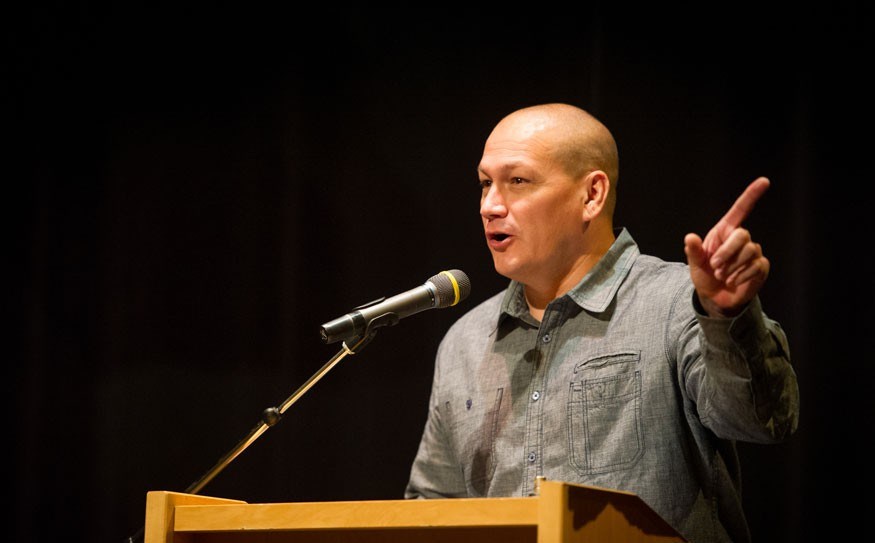Before he became a Hollywood actor, businessman and motivational speaker, Gary "Litefoot" Davis was a rapper.
Gathering inspiration from his home on the Cherokee Nation of Oklahoma, Davis became a pioneer of Aboriginal hip hop in the early 90s with intensely political lyrics about contemporary First Nations issues.
Since then, he's paved the way for other artists while using his career as a launch pad for vastly different endeavours, including his current stint as president and CEO of the National Center for American Indian Enterprise Development and acting in big-name productions like The Indian in the Cupboard, Mortal Kombat and Adaptation.
Last Saturday, the U.S. consulate in Vancouver brought Davis to Whistler to speak as part of the Aboriginal Youth Ambassador program during the Spirit Within Festival. After he finished signing autographs and posing for photos, the Pique sat down with him to talk about his storied music career, challenges facing Aboriginal hip hop artists and the future of the genre.
Pique: When your first release came out in 1992, was your goal to speak to a wide audience or people in your community?
Gary Davis: It's always been to have a further reach but the most important thing is to make sure our community is hearing it. I remember sitting there watching TV and not seeing native people represented on TV. Not being able to pick up a magazine and see us in it. I understood from day one that, best-case scenario, my music would help create some bridges, if nothing else, to help bring people together. Nobody else was doing it. As many African-American rap artists as there were expressing pride in their heritage, why couldn't we do that?
Pique: Obviously black hip hop has achieved mainstream popularity. Why has it been so much harder for Aboriginal hip hop?
GD: The world just doesn't know. To try to convey it to people in the industry, they don't see the relevance of it. I think the second part of it is they're not sure if there will be an appreciation for it amongst the masses. Unlike the African-American community, which has the population and the numbers to support it financially, and the (widespread) understanding of the African-American struggle and experience, there are a lot of common denominators there that equate to supporting it from an industry point of view. We're still working through that. I think it will happen, but it's tough.
Pique: Have you seen changes since you first started in 1992? Has progress been made?
GD: In the United States? No.
Pique: So what keeps you going?
GD: In 1993 I had been offered a record deal and they told me, 'We don't want you to rap anything about your culture.' It was a major label. It was very, very brash and arrogant how it was communicated to me: 'Your people don't buy music, they buy alcohol.' Those kinds of statements, they're so ignorant of how offensive it is. I turned down the record deal and I went back home to Oklahoma and started Red Vinyl Records the next week. I just kind of got on a mission to go out in all the ways we could to promote the music.
Pique: What is it about hip hop versus, like, being a singer-songwriter that appealed to you?
GD: I could say what I wanted to say how I wanted to say it. I can't sing. That's never stopped a lot of people, but long story short, I also listened to it. I was a fan before I was involved in it. For me poetry and writing was just easy. It was like breathing for me. It's not hard for me to sit down and make things that make sense and rhyme come out of me on paper. I knew that I had that gift. I just never knew it would be put together in that way.
Pique: What do you see in the future for Aboriginal hip hop?
GD: If Aboriginal hip hop will get out of Aboriginal hip hop's way, I think it'll be great. Because we come from a community that has been oppressed, nobody wants to give credit for anything because everyone did it on their own. And I get that. I kind of hope it ultimately becomes something the world can listen to and better understand who we are, no matter what an artist raps about. But I hope that those folks that do that understand that they should really keep the music to a certain standard of quality. Often times in music we settle for less than what would be industry acceptable. I would hope they keep their lyrics to where any kid who listens to it would be like, 'Did you hear what he just said? Did you hear how crazy that was?' That's what gets me excited about hip hop. Up your game, you're representing all our people.
Pique: Can fans expect a new album any time soon?
GD: For me, I think I have to put a period at the end of the sentence. I haven't made that record yet. I absolutely know it will come. I don't want to blow through something because I know if this is the last of all of these albums, it's a lot of pressure to say something relevant and present. This last album has to mean something 20 years from now. I have to have the time to open up and just let it come out and not be distracted by what I'm going to do tomorrow.




